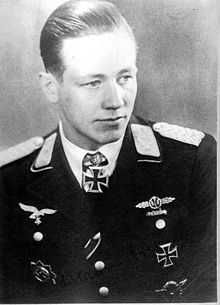Martin Drewes
| Martin Drewes | |
|---|---|
 Martin Drewes | |
| Born |
20 October 1918 Salzgitter, Germany |
| Died |
13 October 2013 (aged 94) Blumenau, Brazil |
| Allegiance |
|
| Service/branch |
|
| Years of service | 1937–45 |
| Rank | Major |
| Unit | ZG 76, NJG 3 and NJG 1 |
| Commands held | III./NJG 1 |
| Battles/wars |
|
| Awards | Ritterkreuz mit Eichenlaub |
| Other work | Civil pilot, businessman |
Martin Drewes (20 October 1918 – 13 October 2013) was a night fighter flying ace in the German Luftwaffe during World War II.[Note 1] He is credited with 52 victories of which 43 were claimed at night[Note 2] mainly against British four-engine bombers whilst flying variants of the Messerschmitt Bf 110.
Early life
Drewes was born on 20 October 1918 in Lobmachtersen-bei-Braunschweig, a small village near Hannover in northwestern Germany, the son of a local pharmacist. As the end of the 1930s, Drewes volunteered for the officer's school of the German Army and at the end of the course transferred to the Luftwaffe during 1939.
World War II
Drewes was first assigned to II./Zerstörergeschwader 76 (ZG 76—76th Destroyer Wing) flying the Messerschmitt Bf 110, operating defensive patrols over the North Sea. In May 1941 the Luftwaffe committed Flyer Command Iraq (Fliegerführer Irak), which comprised one squadron (Staffel) of He 111s (4./Kampfgeschwader 4), one Staffel of Zerstörer (Bf 110s of 4./ZG 76), and 12 transports including a number of Junkers Ju 90s to support the Iraqi rebels during the Anglo-Iraqi War.
The ten-day stint in the Middle East saw Drewes shoot down a British Gloster Gladiator biplane. Allied air-opposition was light and the Luftwaffe force concentrated mainly on ground support duties. By 26 May, despite cannibalizing two machines damaged in a Royal Air Force (RAF) raid on Mosul, no Bf 110 was left serviceable.[1] Drewes and his unit were evacuated the following day. Soon after ZG 76 was converted to a night fighter unit and renamed Nachtjagdgeschwader 3 (NJG 3—3rd Night Fighter Wing).
Drewes scored regular night victories over Germany, before being transferred to Nachtjagdgeschwader 1 (NJG 1—1st Night Fighter Wing) where he would remain until the end of the war. In 1944 he became Gruppenkommandeur III./NJG 1. His adjutant in the group at the time was Oberleutnant Walter Scheel, who later became the President of Germany (1 July 1974 – 30 June 1979). At the end of hostilities he had flown 252 operations, and claimed a total of 52 victories (including a Spitfire, a Gladiator, seven American 4-engined bombers shot down in daylight operations, and 43 British bombers at night), most of them achieved with his crew Oberfeldwebel Georg "Schorsch" Petz and Oberfeldwebel Erich Handke. Drewes was decorated with Ritterkreuz and Eichenlaub. He was captured by British forces at the end of the war.
Postwar
In 1949, Drewes emigrated to Brazil, where he built a career as an entrepreneur and married a Brazilian woman. The long marriage ended only in 2010 by the death of his wife. He returned at least once each year on visits to Germany. He died on 13 October 2013 in Blumenau, southern Brazil, of natural causes.
List of victories

235 missions
- 1 Gloster Gladiator
- 1 Supermarine Spitfire
- 1 Short Stirling
- 1 Consolidated B-24 Liberator
- 6 Boeing B-17
- 9 Handley Page Halifax
- 33 Avro Lancaster[Note 3][Note 4]
Awards
- Iron Cross (1939)
- German Cross in Gold on 24 February 1944 as Oberleutnant in the 11./NJG 1[3]
- Ehrenpokal der Luftwaffe (31 March 1944)
- Knight's Cross of the Iron Cross with Oak Leaves
Notes
- ↑ For a list of Luftwaffe night fighter aces see List of German World War II night fighter aces
- ↑ 49 confirmed by Luftwaffe and 3 process interrupted in war finish
- ↑ 5 Lancasters on 4 May 1944
- ↑ 4 Lancasters and 1 Halifax on 22 May 1944
- ↑ According to Scherzer as leader of the III./Nachtjagdgeschwader 1.[5]
References
- Citations
- Bibliography
- Drewes, Martin (2002). Sombras da noite. Rio de Janeiro: Adler Editora. ISBN 85-89015-02-5.
- Fellgiebel, Walther-Peer (2000). Die Träger des Ritterkreuzes des Eisernen Kreuzes 1939–1945 – Die Inhaber der höchsten Auszeichnung des Zweiten Weltkrieges aller Wehrmachtteile [The Bearers of the Knight's Cross of the Iron Cross 1939–1945 — The Owners of the Highest Award of the Second World War of all Wehrmacht Branches] (in German). Friedberg, Germany: Podzun-Pallas. ISBN 978-3-7909-0284-6.
- Mauermann, Helmut (2005). Fliegerhorst Störmede. Eine Chronik in Bild und Wort. German language book of the base of III./NJG 1 December 1944 until March 1945, with a foreword of Martin Drewes
- Obermaier, Ernst (1989). Die Ritterkreuzträger der Luftwaffe Jagdflieger 1939 – 1945 [The Knight's Cross Bearers of the Luftwaffe Fighter Force 1941 – 1945] (in German). Mainz, Germany: Verlag Dieter Hoffmann. ISBN 978-3-87341-065-7.
- Patzwall, Klaus D.; Scherzer, Veit (2001). Das Deutsche Kreuz 1941 – 1945 Geschichte und Inhaber Band II [The German Cross 1941 – 1945 History and Recipients Volume 2] (in German). Norderstedt, Germany: Verlag Klaus D. Patzwall. ISBN 978-3-931533-45-8.
- Scherzer, Veit (2007). Die Ritterkreuzträger 1939–1945 Die Inhaber des Ritterkreuzes des Eisernen Kreuzes 1939 von Heer, Luftwaffe, Kriegsmarine, Waffen-SS, Volkssturm sowie mit Deutschland verbündeter Streitkräfte nach den Unterlagen des Bundesarchives [The Knight's Cross Bearers 1939–1945 The Holders of the Knight's Cross of the Iron Cross 1939 by Army, Air Force, Navy, Waffen-SS, Volkssturm and Allied Forces with Germany According to the Documents of the Federal Archives] (in German). Jena, Germany: Scherzers Miltaer-Verlag. ISBN 978-3-938845-17-2.
- Thomas, Franz (1997). Die Eichenlaubträger 1939–1945 Band 1: A–K [The Oak Leaves Bearers 1939–1945 Volume 1: A–K] (in German). Osnabrück, Germany: Biblio-Verlag. ISBN 978-3-7648-2299-6.
- Weal, John (1999). Messerschmitt Bf 110 Zerstörer Aces World War Two. Oxford: Osprey. ISBN 1-85532-753-8.
External links
| |||||||||||||
| ||||||||||||||||||||||||||||||
|

